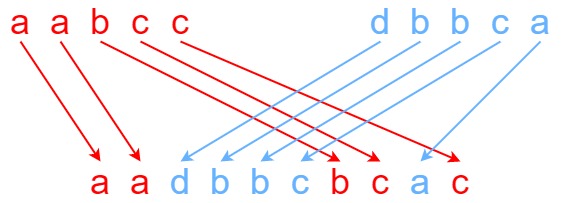97. Interleaving String


Description
Given strings s1, s2, and s3, find whether s3 is formed by an interleaving of s1 and s2.
An interleaving of two strings s and t is a configuration where s and t are divided into n and m non-empty substrings respectively, such that:
s = s1 + s2 + ... + snt = t1 + t2 + ... + tm|n - m| <= 1- The interleaving is
s1 + t1 + s2 + t2 + s3 + t3 + ...ort1 + s1 + t2 + s2 + t3 + s3 + ...
Note: a + b is the concatenation of strings a and b.
Example 1:

Input: s1 = "aabcc", s2 = "dbbca", s3 = "aadbbcbcac" Output: true Explanation: One way to obtain s3 is: Split s1 into s1 = "aa" + "bc" + "c", and s2 into s2 = "dbbc" + "a". Interleaving the two splits, we get "aa" + "dbbc" + "bc" + "a" + "c" = "aadbbcbcac". Since s3 can be obtained by interleaving s1 and s2, we return true.
Example 2:
Input: s1 = "aabcc", s2 = "dbbca", s3 = "aadbbbaccc" Output: false Explanation: Notice how it is impossible to interleave s2 with any other string to obtain s3.
Example 3:
Input: s1 = "", s2 = "", s3 = "" Output: true
Constraints:
0 <= s1.length, s2.length <= 1000 <= s3.length <= 200s1,s2, ands3consist of lowercase English letters.
Follow up: Could you solve it using only O(s2.length) additional memory space?
Solution
interleaving-string.py
class Solution:
def isInterleave(self, s1: str, s2: str, s3: str) -> bool:
n, m, k = len(s1), len(s2), len(s3)
if n + m != k: return False
@cache
def go(a, b):
if a + b == k:
return True
res = False
if a < n and s1[a] == s3[a + b]:
res |= go(a + 1, b)
if b < m and s2[b] == s3[a + b]:
res |= go(a, b + 1)
return res
return go(0, 0)